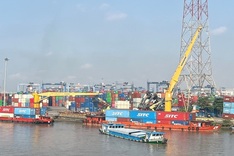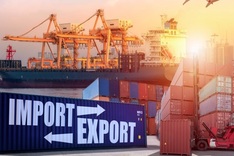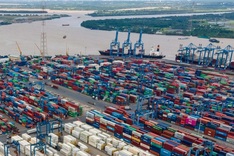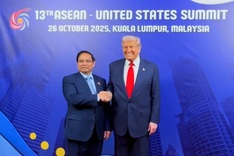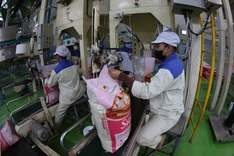>> ADB President: Vietnam can control inflation
>> Minister: Vietnam sets inflation target at 11.75% this year
>> PM: Vietnam aims for average GDP growth of 7%
At least one forecast predicts an inflation rate of over 15% this year, despite the Government’s recent economic policies.
 According to the annual economic report for 2011 by the Vietnam Centre for Economics and Policy Research under University of Economics and Business - VNU, the economy will only grow by about 6.2% this year. The report was made with support from the U.K Department For International Development.
According to the annual economic report for 2011 by the Vietnam Centre for Economics and Policy Research under University of Economics and Business - VNU, the economy will only grow by about 6.2% this year. The report was made with support from the U.K Department For International Development.
The report outlines two possible scenarios for Vietnam’s economy this year.
One scenario is that, if the government stands firm on tightening monetary policies and cutting back on public investment, the country’s inflation might be capped at 15.5%.
The figure is much higher than the rate of 11.75% targeted by the Government.
The growth rate would also be lower than expected, at 6.2% instead of the 7%-7.5% that was previously expected, and approved by the National Assembly.
On the other hand, the report says that if the Government’s new, austere economic policies are not strictly carried out, inflation could climb as high as 18%.
According to the report, high inflation and interest rates are among the prime factors that could discourage economic growth, and may also result in instability in the banking and realty sectors.
State-owned enterprises (SOEs) such as the Electricity of Vietnam Group (EVN), Vietnam National Petroleum Corp (Petrolimex) and Vietnam National Oil and Gas Group (PetroVietnam), have been facing great financial challenges, which may cause problems in the state budget.
Govt urged to narrow its businesses
The report pointed out several shortcomings in the regulation of the national economy. The authors elaborated that economic growth based on investment expansion and a heavy dependence on state-owned firms have been hindering the country’s growth potential.
The financial troubles at SOEs such as Vinashin, EVN and PetroVietnam were pointed out as examples. In these cases the Government and public were unaware of the problems until it was too late.
The report also underlined shortcomings in the drafting of economic policy, which has tended to lag behind the actual market. This, they reported, has a stagnating effect on growth.
They recommended that that the Government should balance it’s budget and do a thorough reevaluation of financial policies, particularly the ideology that places so much importance on the state-owned sector. According to the report, the government should cut back on its business operations and focus more on social welfare.
They call for a speedy and steady equitisation of SOEs in a bid to ease the burden on the state budget. According to the report, the Government must place a high priority on meeting its commitments in order to heighten confidence. This, they say, will be key to successfully curbing inflation.

